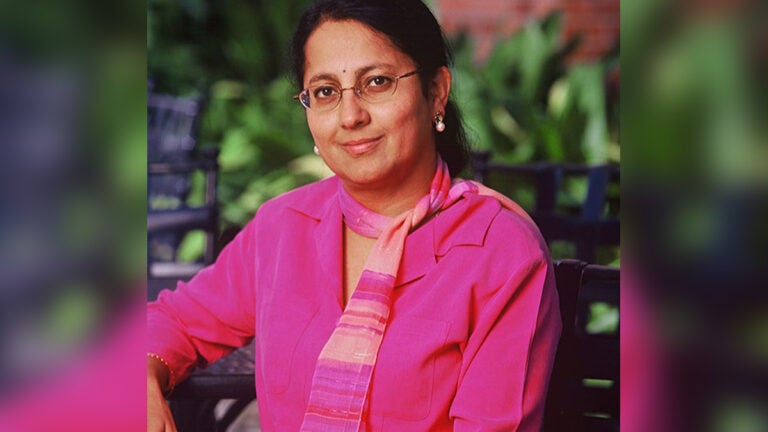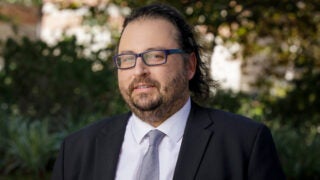
Nandini Rajagopalan is the Joseph A. DeBell Chair in Business Administration and a professor of management and organization at the USC Marshall School of Business. (Photo/Courtesy of USC Marshall)
Representation matters for USC Marshall Title IX trailblazer
TITLE IX: Professor Nandini Rajagopalan draws from her experience in India to create an encouraging environment for her students and mentees at USC.
Editor’s note: Title IX — the landmark legislation that prohibits sex discrimination in educational institutions that receive federal funding — was signed into law on June 23, 1972. In recognition of this anniversary, we’ll be profiling Trojan Title IX trailblazers throughout the academic year.
Nandini Rajagopalan has had an impressive career at the USC Marshall School of Business over the past 33 years. She’s risen through the ranks to hold two named chair positions — she’s currently Joseph A. DeBell Chair in Business Administration — and leadership roles including research director at the Lloyd Greif Center for Entrepreneurial Studies and vice dean for faculty and academic affairs. Along the way, she’s earned accolades for her scholarship, teaching, mentoring and service.
But she’s always been aware that she’s working in two traditionally male-dominated worlds.
“I’m in strategic management, and the strategic management field and business schools in general have underrepresentation, especially where women are concerned,” she said. “Quite early on in my career I was conscious of this lack of a balance between men and women in the workplace and business schools.”
That’s why she believes Title IX — the landmark 1972 legislation that prohibits sex discrimination in educational institutions that receive federal funding — is so important.
“I’m inordinately lucky to have the educational access and the privilege to work in a very progressive state, to be in academia in a progressive institution which is fully aware of and sensitive to the challenges people face,” she said. “Without Title IX, I think many others who are not lucky enough to be in an environment like I am would be without any recourse or protection.”
While Rajagopalan says it’s hard to believe that Title IX has been around for 50 years, it’s also hard for her to believe it’s only been around that long.
“I always thought Title IX must have been around forever,” she said. “When I first came to this country from India in 1984, the impression I had, which is true to this day, is it’s a land of opportunity, it’s a land of equity.
“I came from a very traditional, hierarchical, patriarchal society. When I got my first graduate degree, there were a lot of societal — implicit and explicit — constraints and restrictions on women in the workforce,” she said. “Given that backdrop, what I found in the U.S. was that access to opportunities and resources did not seem contingent on who you were, either your race or gender or sexual orientation. So it was a bit surprising years later to find out that Title IX was quite recent.”
Even though USC Marshall has been a leader in reaching gender parity in its undergraduate (2021) and MBA (2018) programs, Rajagopalan remembers years ago when she was the only female full professor in her department.
Title IX trailblazer recalls discrimination in India
While she has experienced strong support at USC over the decades, she remembers vividly one instance of gender discrimination in India. Having earned an MBA from arguably the most competitive institution in the country — the Indian Institute of Management, Ahmedabad — Rajagopalan was working as a management consultant in a large city. Then she got married and moved with her husband to Bangalore, which was then an upcoming urban environment, where he had a new job and some of his family lived.
I thought everything was going well until he asked me a question which shook me up …
Nandini Rajagopalan, USC Marshall
She made it through two rounds of interviews with a well-known professional services firm before interviewing with the CFO: “I thought everything was going well until he asked me a question which shook me up: ‘What brings you to Bangalore? Why are you looking for a job?’”
She told him about her husband, whose family name was well-known, and how she had moved with him and wanted to continue to work but her current employer did not have an office there she could transfer to. “And he said something that frankly, looking back, would be horrifying to anyone to hear today. He said, ‘You’re a happily married young woman from a very respectable family. You don’t need to work,’” she said.
“I was stunned. I sat there and then I said, ‘You’re not giving me the job, are you?’ And he said, ‘Oh, no. I’m not saying that. I’m just advising you like an older brother might.’”
Fortunately, she had not quit her consulting job; she had taken a leave of absence. And her mother-in-law encouraged her not to give up: “You’re not quitting your job.” Rajagopalan and her husband lived separately for six months until he was able to transfer from his company. She considers her mother-in-law an early inspiration: “To this day — she is 96 and still lives in India — she is one of my strongest supporters and advocates.”
Some of the other women who inspire her today include Michelle Obama, former New Zealand Prime Minister Jacinda Ardern, PepsiCo Chief Executive Officer Indra Nooyi and Indian political activist Kasturba Gandhi. (Rajagopalan and her husband, also a USC Marshall faculty member, provided some financial support for Cynthia Lukas’ recent PBS documentary on the woman who first showed her husband the value of peaceful resistance, Kasturba Gandhi: Accidental Activist.)
Rajagopalan recently visited her childhood school in India for the first time since graduating and learned that the woman who was her language arts teacher from third to 11th grade had passed away two decades prior. Looking back, Rajagopalan realized that her teacher had changed her life, especially in her passionate encouragement of young girls to explore opportunities traditionally reserved for boys. So she set up an endowment in her teacher’s name for graduating students — women and men — who excelled in academics and extracurricular achievements. “She was my first role model. She was the first person to encourage me to participate in debates and take advantage of every opportunity to speak up,” Rajagopalan said.
Title IX trailblazer: Beloved teacher and mentor
Like her childhood role model, Rajagopalan has established herself as a beloved teacher and mentor, earning numerous awards and honors from her students and the university. The USC Provost’s Mentoring Award she won in 2017 remains her most cherished award.
In her leadership roles as a mentor and as vice dean, Rajagopalan recognized that she could go beyond ensuring compliance with Title IX; she could be proactive: “I recognized the impact I could have on others, my juniors, my mentees, to help them understand how to identify and access opportunities and resources.
I recognized the impact I could have on others, my juniors, my mentees, to help them understand how to identify and access opportunities and resources.
Nandini Rajagopalan, USC Marshall
“Also, at Marshall one of the questions we always ask is, what can we do to make sure that those who teach truly represent the students and the communities our students are going to go work in?”
She is very pleased that USC Marshall has put in place many initiatives to answer this question. Among them is partnering with The PhD Project — a multi-institutional effort to diversify corporate America by diversifying role models in classrooms — “so that we can identify people who may not apply through the traditional sources, and then also actively build a pipeline.”
“I think this is a collective endeavor. It’s a problem that affects every business school. So, I think we need to make collective investments. And we have a long way to go, to put it bluntly.”




